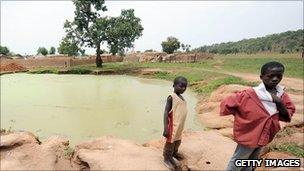Nigeria lead poisoning death toll 'doubles'
- Published

At least 400 children have died from lead poisoning in northern Nigeria this year, twice as many as previously reported, the UN says.
It has sent an environmental team to investigate the poisoning in Zamfara state, caused by illegal gold mining in areas contaminated with lead.
"The lead pollution and intoxication crisis in Zamfara state is far from over," a UN spokeswoman said.
Thousands more people are believed to still be at risk.
"An urgent and co-ordinated response is needed," Reuters news agency quotes Elisabeth Byrs, spokeswoman of the UN Office for the Co-ordination of Humanitarian Affairs (Ocha), as saying at a news briefing in Geneva.
Last month, Ocha said it believed 200 children had died and 18,000 people were affected.
Ms Byrs said the increase in the number of deaths was based on reports from the humanitarian agency Medecins Sans Frontieres.
The international humanitarian organisation is treating a further 500 children in its four clinics, she said.
El-Shafii Muhammad Ahmad, project director for MSF, told AFP news agency the death toll was even higher than records show.
"[It] is an under-estimation because many lead-related deaths are never reported and in many cases, these communities attribute them to other factors or deny them altogether," he said.
To extract gold, deadly amounts of lead were released and soil containing lead deposits was dumped in water sources and in places where children played.
The contamination was discovered earlier this year during the country's annual immunisation programme, when visiting doctors realised children in the region were dying in unusually large numbers. In several villages they saw there were virtually no children.
Villagers said the children had died of malaria and it was only when an MSF took blood tests from local people that the high concentrations of lead were discovered.
- Published27 August 2010
- Published10 June 2010
- Published7 June 2010
- Published4 June 2010